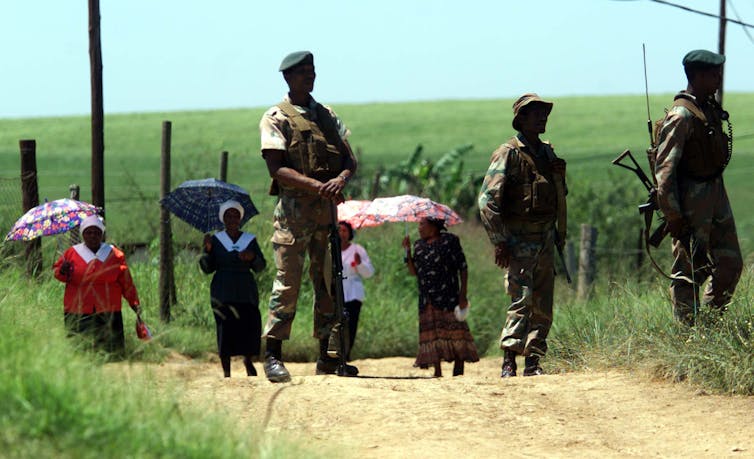
Reuters
South Africa’s police minister, Fikile Mbalula, has stirred controversy by calling for the involvement of the country’s military in fighting crime. Although there might be short term gains from deploying the South African National Defence Force (SANDF) in crime-ridden urban areas of the country, there are several reasons why it should be discouraged.
An obvious reason is that, tactically, militaries are not trained to do community protection and fighting crime in urban communities. They aren’t taught and trained how to apply police and law enforcement rules when it comes to the use of minimum force, or how to follow the proper procedures during an arrest.
Moreover, soldiers are generically trained to use machine guns, not pistols. Also, military doctrine and command structures are not suited to deployments in urban areas and especially to fight gangsterism. In short, armies are basically geared to fight external enemies.
Mexico is a case in point from a South African perspective. A decade ago the country’s military was brought in to fight drug cartels - a role its leadership is now questioning. The Mexican Defence Minister Salvador Cienfuegos recently pointed out that their responsibilities in fighting crime doesn’t correspond with their training.
We didn’t study how to chase criminals.
South Africa can learn from the Mexican experience. There are no short cuts to fighting crime, and instead of looking to the SANDF for quick fixes, the South African government should be focused on building a more effective and functional police and crime intelligence service. In simplified terms: the South African Police Service (SAPS) and related law enforcement agencies should improve their institutional capabilities and get the job of crime prevention and fighting done more efficiently. Beyond the fact that it wouldn’t be desirable to use the military in anti-crime efforts in Cape Town and Gauteng, there is also the hard reality that South Africa’s defence force is in a weakened and parlous state in several respects.
Three reasons why it shouldn’t do the job
There are at least three important reasons why the South African National Defence Force shouldn’t be deployed to fight crime in urban communities.
The first is that the country’s defence force is in an increasingly critical state of degeneration. There has been a continuous decline in military spending over the past few decades. In real terms, the defence budget was cut by half between 1989 and 1997. Until 2010 expenditure was pinned at about 1,6% of GDP - which is between 6% and 7% of total government expenditure). Over the past seven years it has levelled out at 1.2% to 1.1% of GDP.
It’s not surprise that the recently adopted Defence Review (2015) found that:
The Defence Force is in a critical state of decline … Left unchecked, and at present funding levels, this decline will severely compromise and further fragment the defence capability. It is clear that certain defence capabilities, if not addressed now, will be lost in the very near future. The longer this prevails, the greater the effort, time and cost will be to restore the Defence Force.
The second reason is that the military is ill-equipped to be called on to fight crime is that it’s been criticised for being unable to meet its current responsibilities,
including being able to fulfil its responsibilities as a peacekeeping force on the continent. In fact South Africa’s participation in continental peacekeeping operations of both the United Nations and the African Union has decreased notably. It’s participation has reached the lowest level since the early 2000s following the recent withdrawal of its soldiers from Darfur, Sudan.
Helmoed-Römer Heitman, one of South Africa’s most authoritative defence analysts contends that:
[t]he reality is that the state of readiness [of the South African National Defence Force] is appalling: The South African National Defence Force is in no way capable of handling anything but the most minor crisis.
The third reason is that, despite insufficient funding, the SANDF has had to take on extra responsibilities over the last seven years. Since 2010 it has taken back the border protection function (and related crime fighting along the borders) from the police and begun patrolling the country’s borders. It is now deployed along the seven provinces that have landward borders with surrounding countries. Tasks range from stopping people attempting to enter South Africa illegally to confiscating contraband, mainly cigarettes and liquor and dagga (marijuana). Since 2011 the SANDF also had to take up the task of assisting the Kruger National Park’s rangers in preventing rhino poaching.
Weak police force is the issue
There is, however, a much bigger issue at stake - the functionality of the SAPS. This is in fact the main issue. The current budget allocation favours public order and safety (earmarked for the police) over defence and state security (partially earmarked for the military). The 2017/18 allocation to the police portfolio was R93bn while the defence portfolio got R53bn.
In 2013 South Africa was listed as having the 11th biggest police force in the world and it gets almost 48% of the total allocation of the overall defence, public order and safety account At the same time, this does not mean that the SAPS is without shortcomings and constraints. According to UN statistics, South Africa is in the lower-middle end of policing ratios compared to other countries in the world.
Theo Neethling, Professor and Head: Political Studies and Governance in the Humanities Faculty, University of the Free State
This article was originally published on The Conversation.
No comments:
Post a Comment